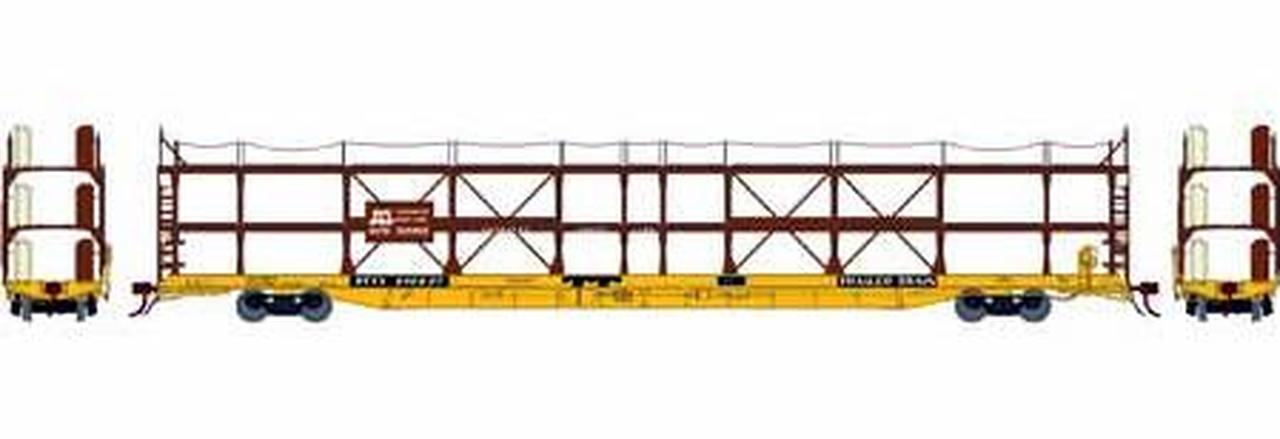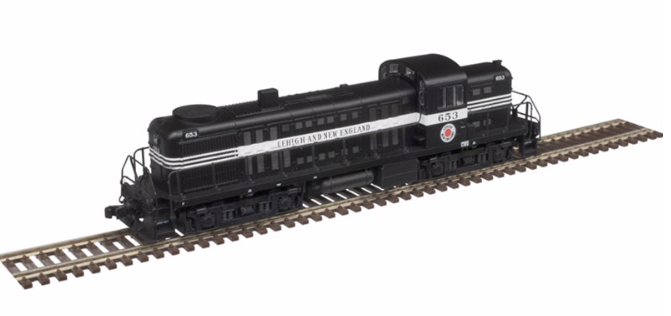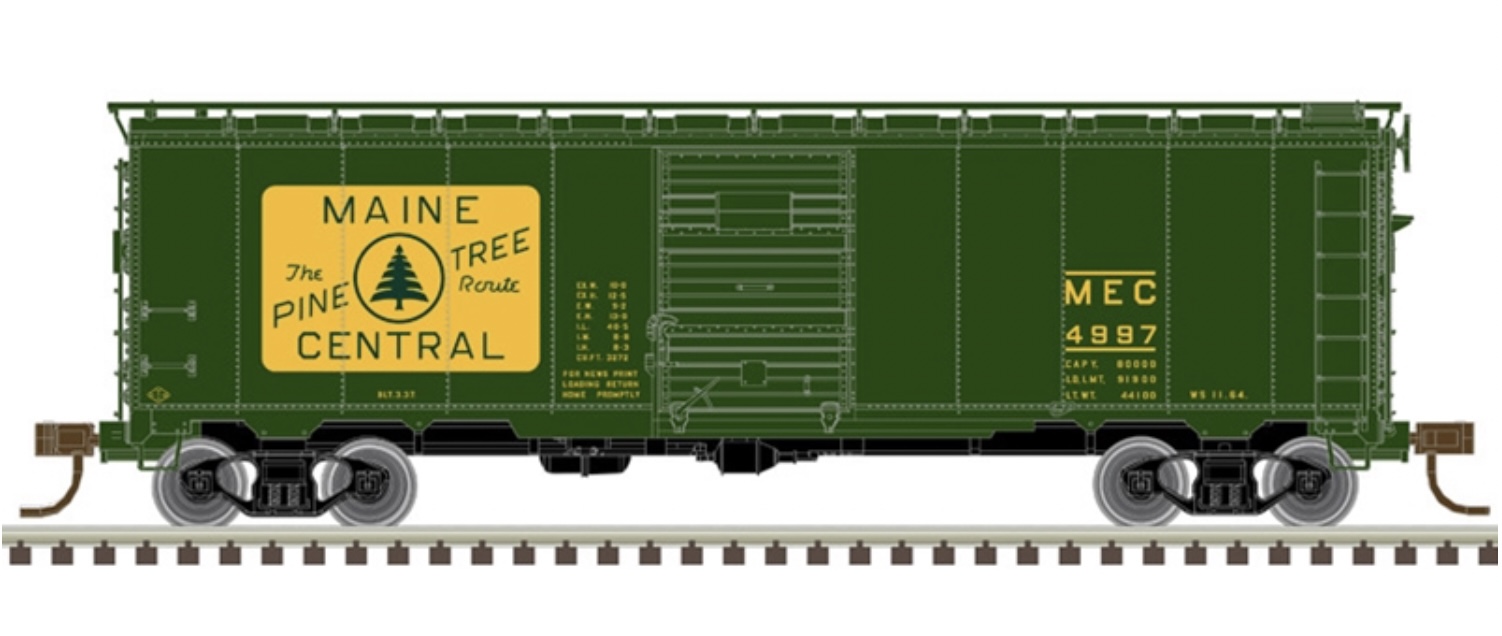Hobbytrain - H24605 - Autorack, Open, Bi-Level, DDM915, Epoch V - DB AutoZug - 2-Pack
| Stock Number | H24605 |
| Brand | Hobbytrain |
| Manufacturer | Hobbytrain |
| Body Style | Hobbytrain Autorack Bi-level DDM |
| Prototype | Autorack, Open, Bi-Level, DDM915, Epoch V |
| Road or Company Name | DB AutoZug (Details) |
| Road or Reporting Number | 2-Pack |
| Paint Color(s) | Red |
| Print Color(s) | Black & White |
| Coupler Type | Rapido Hook NEM Standard Pocket |
| Coupler Mount | Body-Mount |
| Wheel Type | Nickel-Silver Plated Metal |
| Wheel Profile | Small Flange (Low Profile) |
| Multipack | Yes |
| Multipack Count | 2 |
| Release Date | 2020-01-01 |
| Item Category | Rolling Stock (Freight) |
| Model Type | Autorack |
| Model Subtype | Open, Bi-level |
| Model Variety | DDM915 |
| Scale | 1/160 |
| EAN/JAN/GTIN13 Number | 4250528615811 |
Road Name History:
DB AutoZug GmbH was a German rail transport company that provided automobile (Motorail) and night passenger train services for Deutsche Bahn AG. It was based in Dortmund and was a wholly owned subsidiary of Deutsche Bahn AG. On 30 September 2013 the company was merged into DB AG's long-distance division DB Fernverkehr.
Night trains were operated with the sister company CityNightLine AG (headquartered in Zurich, Switzerland); until CityNightLine AG merged with DB NachtZug. DB AutoZug GmbH and CityNightLine were subsidiaries of DB Fernverkehr AG which in turn was a wholly owned subsidiary of DB Mobility Logistics AG. DB AutoZug GmbH was also responsible for the car transporter trains from Niebüll - Westerland, known as the SyltShuttle, as well as the Schifffahrt und Inselbahn Wangeroogeshipping (Island railway of Wangerooge).
The first car transported by rail in Germany was carried by the Deutsche Reichsbahn on 1 April 1930. At first only the rich and privileged could afford cars and the market was small. In the 1950s, Britain and France started to run car transporter trains. In the Summer of 1956, the first true car train in Germany ran, via Hamburg, Munich and also Ostend; the drivers travelled in a passenger car, whilst their automobile was carried by the same train.The German economic recovery in the 1960s brought an increase in travel and a corresponding increase in the number of cars transported, increasing eightfold to 80,000 by 1969, many holiday makers travelling to warmer more sunny parts of Europe. The numbers of cars transported peaked in 1973, at 185,550 vehicles; the oil crisis put an end to this growth. In 1978, the Bundesbahn cut back by 40% its number of terminals due to a lack of demand.[6] The increase in car ownership in the 1980s did little to help the rail-car transporter business - changes in lifestyle meant that people often expected to drive their cars all the way to their holiday destination (which represented most of the car by rail business). Additionally, the seasonal nature of the business meant that buying new wagons was not profitable. In this decade the number of people flying over to a holiday overtook those travelling by rail. Also in this decade, the transport of caravans and boats also ceased. After the merger of the Deutsche Bundesbahn and the Deutsche Reichsbahn - in 1996 a new company was formed: DB AutoZug.From Wikipedia
Night trains were operated with the sister company CityNightLine AG (headquartered in Zurich, Switzerland); until CityNightLine AG merged with DB NachtZug. DB AutoZug GmbH and CityNightLine were subsidiaries of DB Fernverkehr AG which in turn was a wholly owned subsidiary of DB Mobility Logistics AG. DB AutoZug GmbH was also responsible for the car transporter trains from Niebüll - Westerland, known as the SyltShuttle, as well as the Schifffahrt und Inselbahn Wangeroogeshipping (Island railway of Wangerooge).
The first car transported by rail in Germany was carried by the Deutsche Reichsbahn on 1 April 1930. At first only the rich and privileged could afford cars and the market was small. In the 1950s, Britain and France started to run car transporter trains. In the Summer of 1956, the first true car train in Germany ran, via Hamburg, Munich and also Ostend; the drivers travelled in a passenger car, whilst their automobile was carried by the same train.The German economic recovery in the 1960s brought an increase in travel and a corresponding increase in the number of cars transported, increasing eightfold to 80,000 by 1969, many holiday makers travelling to warmer more sunny parts of Europe. The numbers of cars transported peaked in 1973, at 185,550 vehicles; the oil crisis put an end to this growth. In 1978, the Bundesbahn cut back by 40% its number of terminals due to a lack of demand.[6] The increase in car ownership in the 1980s did little to help the rail-car transporter business - changes in lifestyle meant that people often expected to drive their cars all the way to their holiday destination (which represented most of the car by rail business). Additionally, the seasonal nature of the business meant that buying new wagons was not profitable. In this decade the number of people flying over to a holiday overtook those travelling by rail. Also in this decade, the transport of caravans and boats also ceased. After the merger of the Deutsche Bundesbahn and the Deutsche Reichsbahn - in 1996 a new company was formed: DB AutoZug.From Wikipedia
Brand/Importer Information:
Hobbytrain was an Austrian firm, that was acquired by Wolfgang Lemke GmbH in 2002. It produces HO and N scale models.
Item created by: CNW400
on 2023-05-11 09:59:27
Last edited by: CNW400 on 2023-05-11 10:07:04
If you see errors or missing data in this entry, please feel free to log in and edit it. Anyone with a Gmail account can log in instantly.
Last edited by: CNW400 on 2023-05-11 10:07:04
If you see errors or missing data in this entry, please feel free to log in and edit it. Anyone with a Gmail account can log in instantly.









